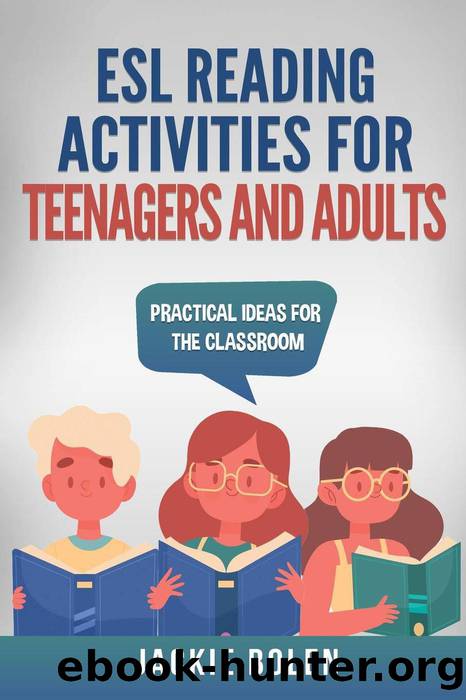ESL Reading Activities for Teenagers and Adults by Jackie Bolen

Author:Jackie Bolen
Language: eng
Format: epub
Tags: esl reading, reading esl, reading, writing, and learning in esl, teaching esl reading, esl teaching reading, english reading comprehension, esl reading comprehension, esl reading activities, esl reading activity, esl reading game, esl reading games
Publisher: Jackie Bolen
Published: 2020-08-18T00:00:00+00:00
Puzzles
Skills: Reading/writing
Reading Sub-Skill: Reading for detail
Time: 10-30 minutes
Level: Beginner-intermediate
Materials Required: A puzzle
Puzzles are an excellent way to review vocabulary and I find that most students enjoy doing them, particularly teenagers. They can also work very well for âquietâ classes that don't have a lot of outgoing students in them where it's hard to do some of the more active games like charades. They help students read for detail as they have to pay close attention to exactly what the clue says in order to answer the question correctly.
It's really easy to make puzzles yourself using something like Discovery.com's Puzzlemaker (www.discoveryeducation.com/free-puzzlemaker) and it's actually the preferable option since you can include all the specific vocabulary that you'd like. I prefer to use the criss-cross option because it has the most educational benefit since it deals with meanings as well as vocabulary words.
Teaching Tips:
It's up to you whether or not to allow dictionaries or textbooks. In my experience, dictionaries don't really help that much while the course book where the words came from really does. You could also say that for the first five minutes, they must only use their brains, but they can use anything they want after that. If there is a particularly hard one that no student is able to get, I'll give the entire class a hint.
Procedure:
1. Go to Discovery.com and find the Puzzlemaker.
2. Design your puzzle (criss-cross is best!), using words and definitions. Alternatively, you could give hints about the word related to the context you'd use it in instead of the actual definition. Here are two examples:
This animal has black and white stripes (skunk).
If a _____ sprays you, you'll smell really bad (skunk).
3. Have students complete the puzzle. I usually make it a bit competitive by putting them in pairs and awarding the first couple of teams a prize of some sort.
4. It's up to you whether or not to allow dictionaries or textbooks. In my experience, dictionaries don't really help that much while the course book where the words came from really does. You could also say that for the first five minutes, they must only use their brains, but they can use anything they want after that. If there is a particularly hard one that no student is able to get, I'll give the entire class a hint.
Download
This site does not store any files on its server. We only index and link to content provided by other sites. Please contact the content providers to delete copyright contents if any and email us, we'll remove relevant links or contents immediately.
Housekeeping by Marilynne Robinson(3424)
The Poetry of Pablo Neruda by Pablo Neruda(3375)
Papillon (English) by Henri Charrière(3283)
World without end by Ken Follett(3016)
TCP IP by Todd Lammle(2648)
Fluent Forever: How to Learn Any Language Fast and Never Forget It by Gabriel Wyner(2457)
The Rape Of Nanking by Iris Chang(2332)
The Alchemist by Paulo Coelho(2309)
How Proust Can Change Your Life by Alain De Botton(2269)
The Partner by John Grisham(1989)
Two lives by Helen Naylor(1950)
Hitler by Ian Kershaw(1759)
Yerma by Federico García Lorca(1646)
Smilla's Sense of Snow by Peter Hoeg(1621)
Merriam-Webster's Pocket Dictionary by Merriam-Webster(1571)
Il cavaliere inesistente by Italo Calvino(1556)
Sophie's World by Jostein Gaarder(1552)
Deep Writing by Eric Maisel(1529)
Twilight of Idols and Anti-Christ by Friedrich Nietzsche(1499)
